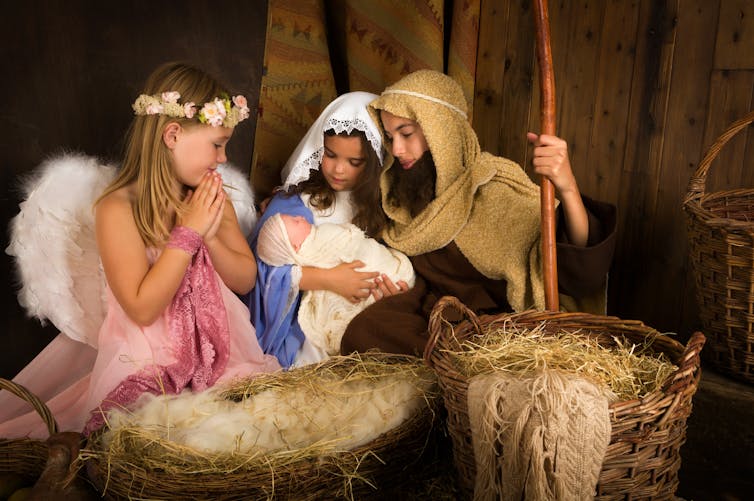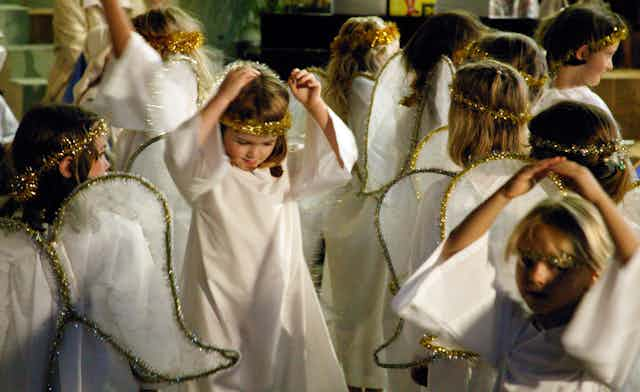As Christmas approaches, many primary schools and nurseries in Britain hold their traditional nativity plays or musicals. Teachers adapt the biblical story of the nativity and children often dress up as angels, innkeepers, shepherds, stars, wise men, Mary or Joseph.
Parents and guardians are usually invited to attend performances in schools – but COVID-19 restrictions have made this more difficult. Parents have recently expressed disappointment or even anger, as a number of schools this year are cancelling nativity plays, limiting the number of attendees, or moving to online-only performances.
Research suggests that parents are attached to nativity plays because they are viewed as an important rite of passage, and bring back fond memories of childhood. Rather than being viewed as a religious celebration, many see nativity plays as being part of British culture.
My own research explores what children think of nativity plays – and other aspects of Christianity in primary schools such as school prayers and hymn singing during assemblies.
I found that children tend to view these practices as part of the school routine rather than as active religious practice. For many of them, too, it is a cultural rather than religious activity. The children often give the Christian practices in which they take part their own, individual meanings.
Enshrined in law
In England and Wales, law makes it compulsory for every state-funded school to not only teach religious education classes, but also hold daily acts of collective worship that must be broadly Christian in character.
Over the course of two research projects, I visited 18 primary schools across the West Midlands, England. Six of these were non-religious. While each of these non-religious schools interpreted the legislation in their own ways, it usually meant that assemblies contained an element of Christianity. This may take the form of hymn singing, reciting a school prayer, or listening to a story that promotes broadly Christian values such as loving and caring for one another.

In one of the schools, which I regularly visited for a year, primary schoolchildren used to end assemblies by reciting a school prayer. They would bow their heads and join their hands together, and address their prayer to God.
Interestingly, most of the children I spoke to said that they did not consider their school prayer as Christian. They explained that “God” could refer to any god, deity or higher power.
Some went as far as to say that the prayer was not religious at all, and that “God” was just used as an intermediary noun to reach out to anyone they loved or felt connected to. This could be angels, family members or dead relatives. These viewpoints were echoed in other non-religious schools.
Children who identified as belonging to non-Christian traditions also interpreted their school prayer in personal ways. While some indeed considered the school prayer as Christian practice, Mohammed - who identified as Muslim - viewed it as a school activity, devoid of spirituality. On the other hand, Sofian, who also identified as Muslim, counted the school prayer towards his five daily prayers.
The children I spoke to navigated their encounters with Christianity in school in their own ways. This is also true when it comes to nativity plays.
Most children I spoke to viewed Nativity plays and other Christian celebrations such as those held for Harvest or Easter as fun, and as creating a sense of togetherness. They talked about how much fun they had being out of the classroom, celebrating together. They shared memories of the Christmas celebration of Christingle, when they get to hold oranges, blow candles out and eat sweets.
A means of exclusion
While these Christian performances can serve to foster a sense of community, they can also exclude some children. This is particularly true if children have been removed from performances by parents on religious grounds.
Children who do not attend or take part in school celebrations may be viewed as holding religious beliefs that are not compatible with British culture. In fact, my research shows that children often view religious belonging as “un-British”.
While most parents and children view nativity plays as cultural performances, these should be understood within the broader context of the primary school, which still gives a privileged place to Christianity.
By listening to children, we know that primary schools can build a sense of community that is embedded in Christianity. As Christianity becomes bound to British culture, non-Christian religions are often viewed as alien. While many people may see nativity plays as heartwarming, we should also consider the more complex role they play in primary schools and wider culture.

